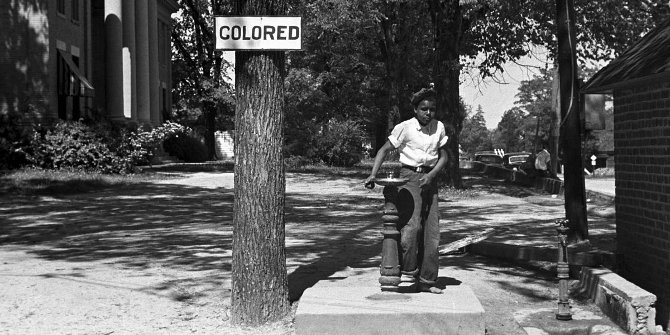 This week, the Supreme Court unanimously concluded that warrants would be necessary for police to search mobile phones. Ellen Goodman argues that the decision could impact the NSA’s gathering of communications metadata and have implications for privacy and freedom of speech.
This week, the Supreme Court unanimously concluded that warrants would be necessary for police to search mobile phones. Ellen Goodman argues that the decision could impact the NSA’s gathering of communications metadata and have implications for privacy and freedom of speech.
Continuing and strengthening a trend in U.S. privacy law, the Supreme Court decided on Wednesday that the constitutional prohibition on unreasonable searches and seizures (Fourth Amendment) requires police to get a warrant before searching a mobile phone incident to arrest. Two years ago, in United States v. Jones, another unanimous Court decided that law enforcement needed a warrant to place a GPS device on a suspect’s car. But that was because there was a physical intrusion. Here, in Riley v. California, the Court fully confronts for the first time the constitutional meaning of digital data capture. The question was whether theright of law enforcement “always recognized under English and American law, to search the person of the accused when legally arrested to discover and seize the fruits or evidences of crime” extends to searches of mobile phones.

The Court concluded unanimously that government could not justify the warrantless search of mobile phones (and presumably other electronic devices with similar functions) on either of the traditional grounds: (1) the interest in seizing weapons or the fruits or evidence of a crime, or (2) the minimal additional intrusion on a suspect already in custody. Neither rationale holds up as reasonable in light of the quantity and quality of information that mobile phones contain.
Applying old law to new technology
What does a 225 year old Constitution say about digital privacy expectations? Chief Justice Roberts seeks the answer in Colonial Americans’ revulsion against the “general warrants … which allowed British officers to rummage through homes in an unrestrained search for evidence of criminal activity.” The question then becomes whether the search of an electronic device found in a pocket is more like the ransacking of a house or the pat-down of a person. After surveying the capabilities of a smartphone, including location tracking, records of Internet browsing history, cloud computing, photographs, video, and apps, the Court sharply distinguishes mobile phones from other physical objects. They are as alike as “a ride on horseback” is to “a flight to the moon.” The rest of the decision grapples for the right analogies, and concludes that:
- Mobile phones are not like wallets. The records they contain differ in terms of variety (mobile phone records “reveal much more in combination than any isolated record”), type (a single record may “convey far more than previously possible”), and provenance (“data on a phone can date back to the purchase of the phone, or even earlier”).
- Mobile phones are as sacrosanct as the home. Justice Holmes once said that it was “a totally different thing to search a man’s pockets and use against him what they contain, from ransacking his house for everything which may incriminate him.” Chief Justice Roberts observes that “a cell phone search would typically expose to the government far more than the most exhaustive search of a house.”
Including the metadata
Of course the question on everyone’s mind is what this decision means for the legality of NSA warrantless data mining. Although it’s not controlling, the sensitivity to digital privacy issues revealed in this decision – reflecting the views of all nine justices – has to make the NSA worry. Interestingly, in a very brief passage, the Riley Court rejects the government’s argument that at least law enforcement should be able to search a phone’s call log information. This is also known as “metadata” of the kind that the NSA has culled, and which at least one lower court has held is entitled to Constitutional protection. Without discussing it, the Court seemed sympathetic, noting that this type of metadata can be very revealing and cannot be categorically distinguished from other data.
In what may be another precursor to some future consideration of NSA activities, the Court addressed the government’s worries about officer safety should the phone communicate with criminal confederates or evidence tampering should the phone be wiped remotely. Often, these are the kinds of security concerns that trump privacy interests. But here, the Court insisted on a bright line rule as a general matter: get a warrant. Exceptions in exigent circumstances will be allowed on a case-by-case basis.
Privacy and free speech implications
The Riley case has implications not only for privacy, but also for free speech. Notably, the New York Times and other media organizations filed an amicus brief in this case, arguing that searches and seizures of mobile phones incident to arrest is bad for journalism. The brief provides many examples of journalists arrested in the course of covering protests and police actions whose mobile phones were confiscated, searched, and sometimes returned with data missing. The nexus between Fourth Amendment privacy protections and First Amendment speech protections is frequently visible, and in this case, it is especially clear. Another unknown – and something to watch – is how this decision impacts the search and seizure of electronic devices at the borders, especially when in the hands of journalists.
This article originally appeared at the LSE’s Media Policy Project blog.
Featured image: Gwyneth Anne Bronwynne Jones (Creative Commons BY SA)
Please read our comments policy before commenting.
Note: This article gives the views of the author, and not the position of USApp– American Politics and Policy, nor of the London School of Economics.
Shortened URL for this post: http://bit.ly/1wHmepO
_________________________________________
 Ellen Goodman – Rutgers University
Ellen Goodman – Rutgers University
Ellen Goodman is a Professor at Rutgers University School of Law.Her research interests include media policy, spectrum policy, the use of information as a policy tool, advertising law, and the informational aspects of sustainability policy. She is an animal law expert and pioneered the teaching of animal law at the law school. She is Co-Director and co-founder of the Rutgers Institute for Information Policy & Law (RIIPL). Professor Goodman recently served as Distinguished Visiting Scholar at the FCC and helped in the production of a pathbreaking report on the Information Needs of Communities. She tweets @ellgood.






